The First Wind Turbine Installation on Makerere University at CONAS
Mr. Jimmy Chaciga, a Ph.D. Student at the Department of Physics, College of Natural Sciences, Makerere University, installed a small-Scale Photovoltaics Solar Plant at the Department of Physics to supply clean renewable energy for a cooking technology being developed with a 2 kW Wind turbine generator added as a backup energy to the solar PV daily generation under the mentorship of Dr. Karidewa Nyeinga, Dr. Denis Okello & Professor Ole J. Nydal.
The solar and wind turbine generates electricity to supply the solar cooker. The turbine generates power as a backup charge of the system at night when there is no solar. The system is both important step to the project work and to the students at the department to facilitate hands on practical skilling, installations and for further testing, and data logging to evaluate the performance of the system and improve on its current capacity and application to solve existing challenges in our society such as lack of fuel for clean cooking and clean lighting homes.
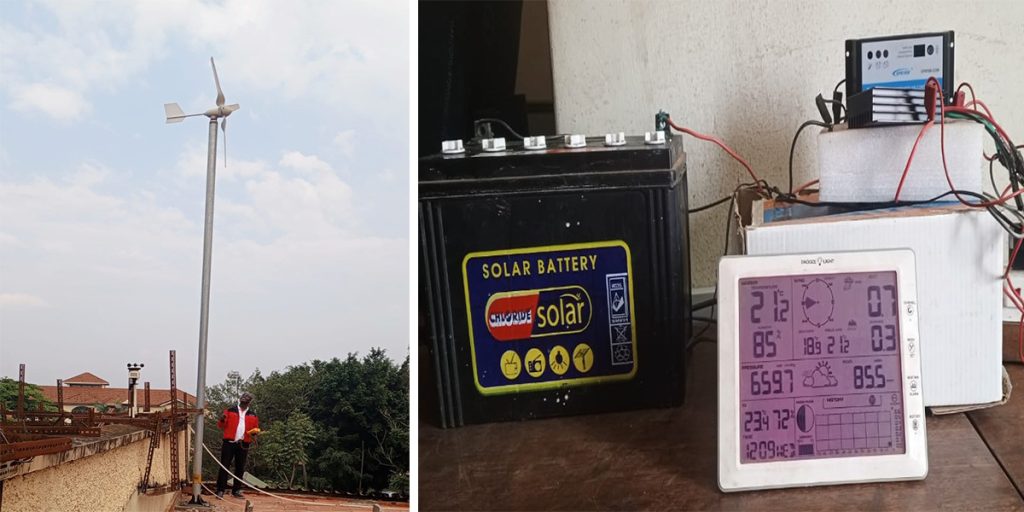
Waste disposal envelopes for self-injectable by College of Health Sciences
On the 16th March 2023, the Disposal Envelopes for self-injectable were launched at the PATH Offices, Kampala, Uganda. The innovation was developed by the Biomedical Engineering research group in the Department of Physiology, School of Biomedical Sciences, College of Health Sciences, Makerere University. The research group including researchers and students headed by Dr. Robert Ssekitoleko developed the envelopes in collaboration with partners based at Case Western Reserve University (CWRU), Ohio, U.S.A. The initial consignment of the envelopes was donated to PATH for distribution to users. The envelopes were officially launched by Dr. Robert Mutumba, Principal Medical Officer Clinical Services, Ministry of Health (MoH), Uganda who represented the Chief Guest, Dr. Charles Olaro – Director, Clinical Services, MoH.
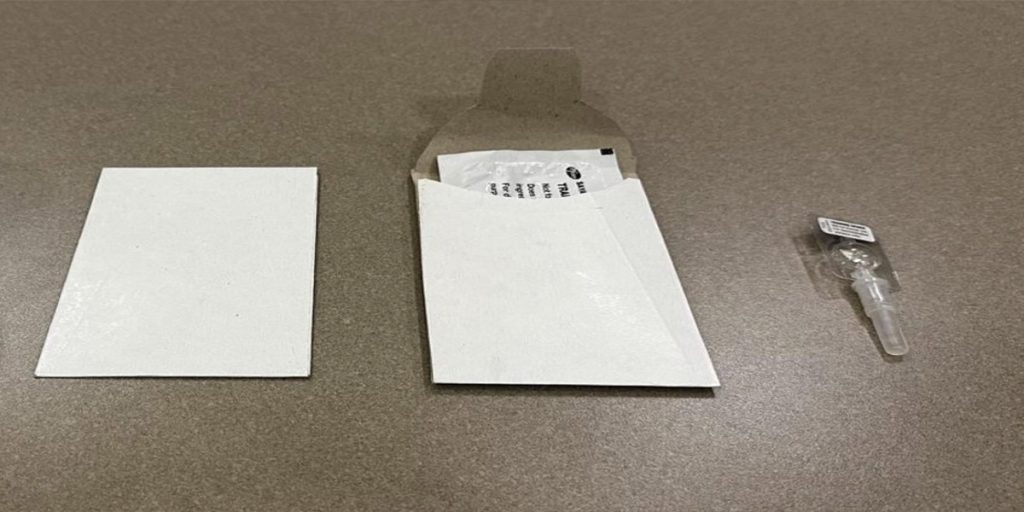
Solar-powered Cooker (MakSol Cooker) by CAES
A cutting-edge solar-powered cooking solution developed to revolutionize cooking practices while reducing carbon footprints in households. Makerere University launched the Solar-powered Cooker developed by researchers from the Department of Agricultural and Biosystems Engineering at the College of Agricultural and Environmental Sciences (CAES) in collaboration with Intellsys (U) Ltd on 14th June 2023. The cooker is an output of a research project titled, “Development, Production Scale-up and Commercialization of an Electric Solar Cooker (MakSol Cooker) to reduce the Cooking Carbon Foot-Print in Households”. The project was supported by the Government of Uganda through the Makerere University Research and Innovations Fund (Mak RIF) and the Science, Technology and Innovation Secretariat-Office of the President.

Tailer-made pasteurizer and fruit pulper adapted according to end-user operational capacity, financial resources and available energy source to support agro-processors
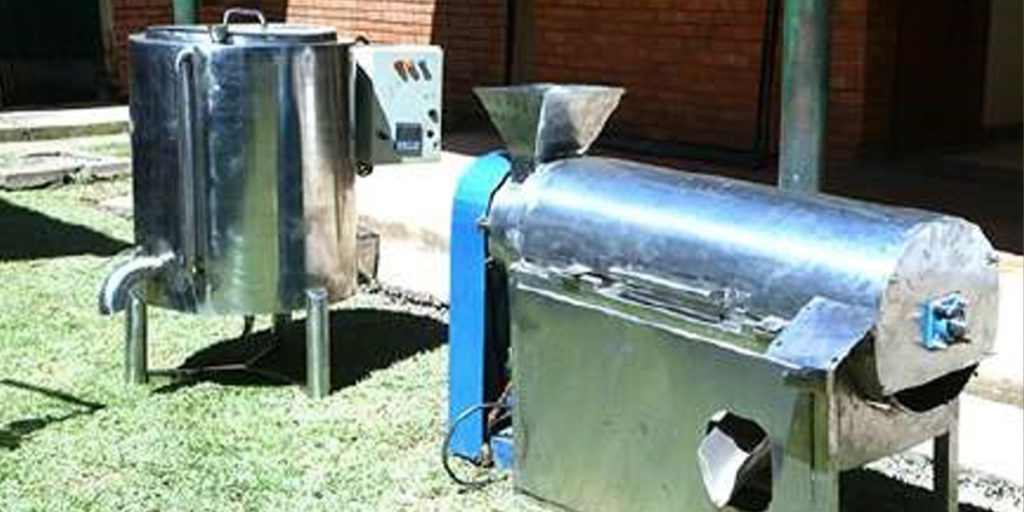
The batch pasteurizer was designed and constructed based on a simple technology with simple components to ensure good operating characteristics including: safety ease of maintenance and cleaning, retention of nutritional quality, easy handling, quick assembly, easy repair and maintenance. Important aspects considered for design included temperature, pressure, size/volume of pasteurization tank and heating system used. The product to be pasteurized is heated indirectly to avoid deterioration in product quality. The batch pasteurizer is available in 150L, 200L, 300L and 500L capacity. The Project was led by Dr. Julia Kigozi, Dean, School of Food Technology, Nutrition and Bio-engineering and supported by FTBIC and the CAES Innovation Scholars Programme (CAESISP)
Transformation of Municipal waste into industrial raw materials at CAES

Due to the high rates of urbanization, municipal waste generation in cities in Uganda is anticipated to grow at a rate higher than 40% by 2050. Using Black Soldier Fly Larvae (BSFL) as a bio-waste management technology for efficient municipal trash conversion, Makerere University researchers and students led by Prof. Fred Kabi from the Department of Agricultural Production at CAES, working with Ento Organic Farm Uganda Ltd in Gayaza transform farm and municipal waste into useful products beyond food, feed and fertilizers. The team extracts liquids from the larvae and using basic science, transforms the liquids into soap and bio-diesel. This is implemented by the Department of Agricultural and Bio-systems Engineering at CAES, and funded by the Conrad N. Hilton Foundation under the Hilton Water Quality Testing Fellowship, Uganda. This initiative strengthens the water and sanitation sector in sub-Saharan Africa by developing skilled professionals
Launch of the the Black Fly Insect Larvae Enterprise for COVID-19 Livelihood Resilience at CoVAB
The College of Veterinary Medicine, Animal Resources and Biosecurity (CoVAB) in Collaboration with Michigan State University has embarked on upscaling the use of the Black Fly Larvae as a source of insect protein for animal production. Dr. Amulen Deborah and Dr. Patrick Vudriko the respective Principal and Co -Investigators are working together with Prof. Eric Benbow and Dr. Jennifer Pechal from Michigan State University in implementing this USAID funded project
Apac Districts gains from CEDAT’s research on piloting a Rural Broadband Connectivity Model and Efficacious patient management system
The School of Engineering shared findings of research that was conducted in Apac District through two projects namely Piloting a Rural Broadband Connectivity Model (RCBM) and Efficacious patient management system (EPMS).
The projects undertaken by research teams in the Electrical Department included Piloting a Rural Broadband Connectivity Model (RCDM) whose main objective was to pilot a model for rural broadband connectivity in support of a knowledge-based economy focusing on the education and agricultural sectors, with Apac as the host District.
The second project, Efficacious Patient Management System (EPMS), aimed at developing a machine learning aided application (MakCOV) for noninvasive screening for COVID 19. It was specifically aimed at developing a machine learning Model for COVID 19 screening utilizing patient’s retrospective data and to integrate the machine learning models with the hardware platform
Innovations using low cost locally available materials for point of use water treatment system unveiled at CEDAT
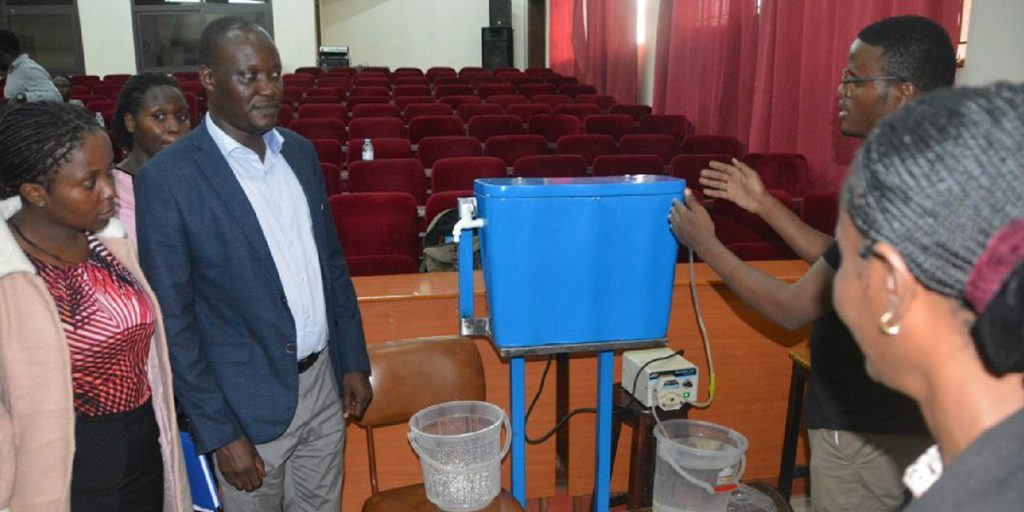
The College of Engineering, Design, Art and Technology (CEDAT) conducted a Research Dissemination of two studies aimed at the Development of Materials for point of use water treatment systems. The investigations were conducted by a team of researchers comprising P. W. Olupot, H. M. Kalibbala, E. Menya, G.M. Wangi, J. Jjagwe, J. Wakatuntu, M. Turyasingura, R. Walozi, C. Kanyesigye and R. N. Kulabako.
The research team set out to develop Point of Use (POU) water filtration systems tailored to a wide range of source water quality to empower households to effectively treat water at home using Granular activated carbon (GAC), especially from renewable biomass sources and nanomaterials which are the two common materials championed for POU systems.
Device to Monitor the Elderly with Dementia & Cognitive Impairment for Emergency response at COCIS
Researchers led by a second-year PhD student Paddy Junior Asiimwe designed a device to monitor elderly people with dementia and cognitive impairment in rural Uganda. The device, wearable by the elderly (on the hand like a wrist watch or placed in the pocket), will monitor the patients’ movement and location and then signal the caretaker and the hospital in case of emergencies.
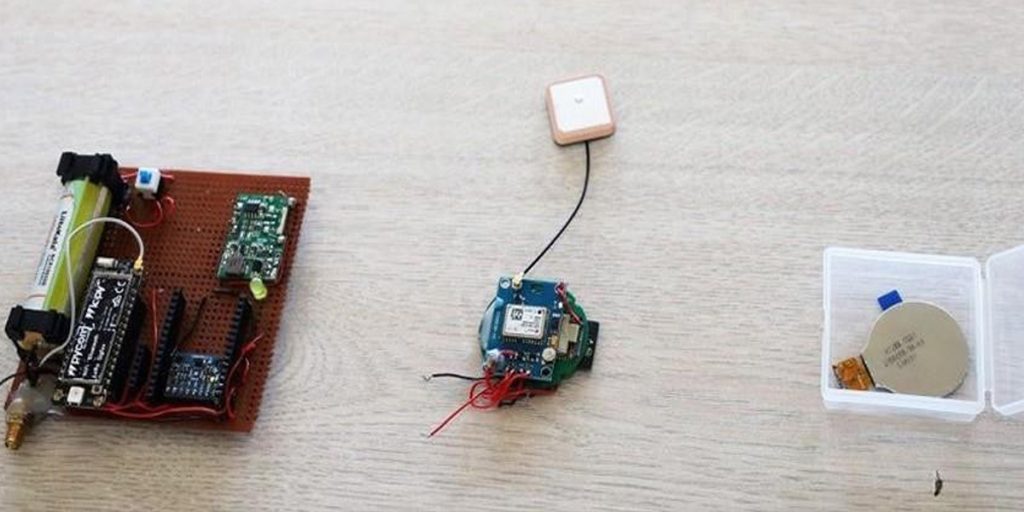
An AI Automated Mobile Microscopic Diagnosis of Malaria, Cancer & Tuberculosis at COCIS
Makerere University under its Artificial Intelligence Lab received a grant funding from Google to support its Ocular project that is undertaking research on usage of Artificial Intelligence to enhance the diagnosis process of Malaria, Tuberculosis and Cervical Cancer in Uganda. The Ocular Project aims at building a standardized point-of-care mobile microscopy for disease diagnosis with a specificity of up to 99%
- The First Wind Turbine Installation on Makerere University at CONAS
- Waste disposal envelopes for self-injectable by College of Health Sciences
- Solar-powered Cooker (MakSol Cooker) by CAES
- Tailer-made pasteurizer and fruit pulper adapted according to end-user operational capacity, financial resources and available energy source to support agro-processors
- Transformation of Municipal waste into industrial raw materials at CAES
- Launch of the the Black Fly Insect Larvae Enterprise for COVID-19 Livelihood Resilience at CoVAB
- Innovations using low cost locally available materials for point of use water treatment system unveiled at CEDAT
- Device to Monitor the Elderly with Dementia & Cognitive Impairment for Emergency response at COCIS
- An AI Automated Mobile Microscopic Diagnosis of Malaria, Cancer & Tuberculosis at COCIS